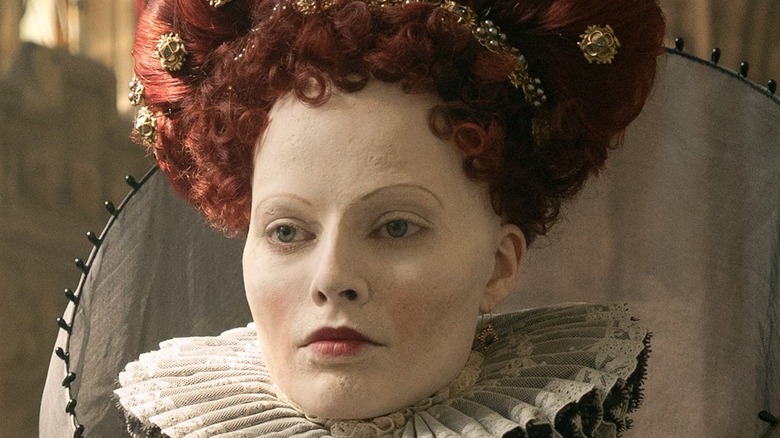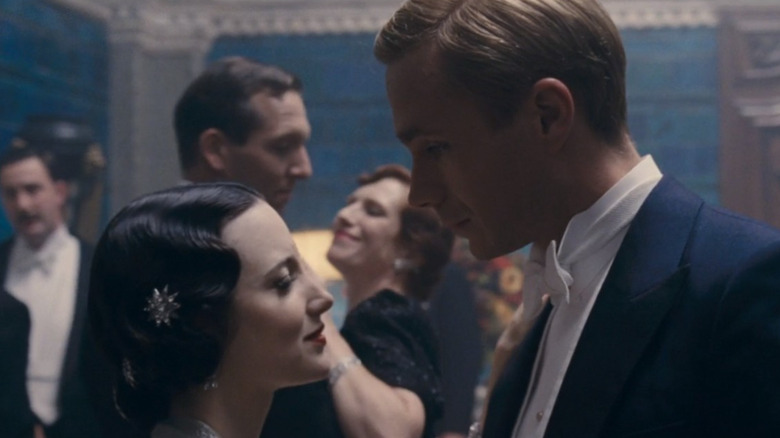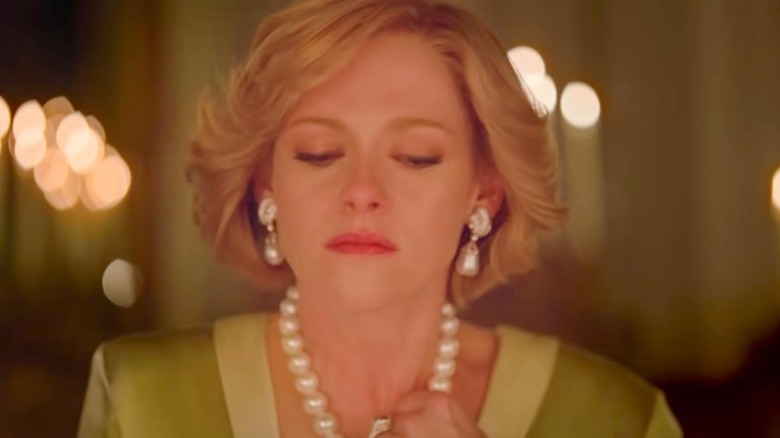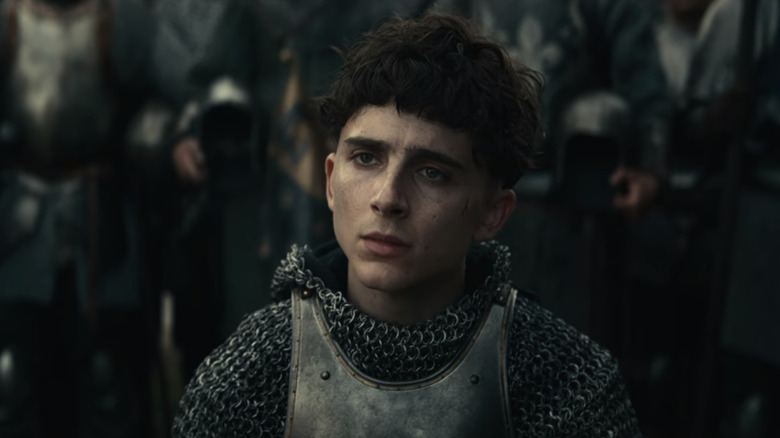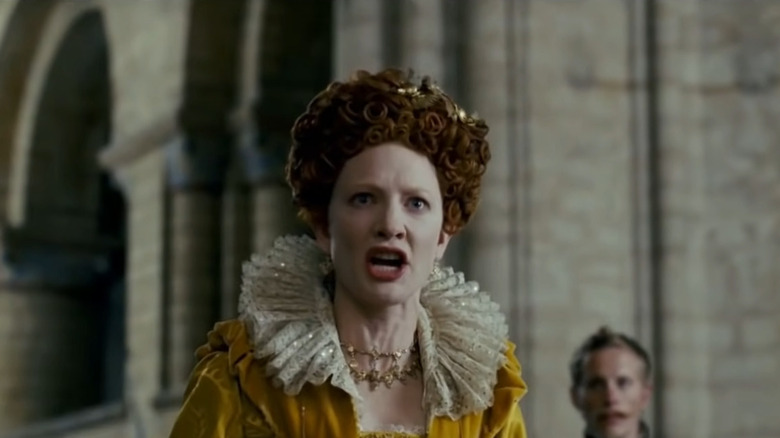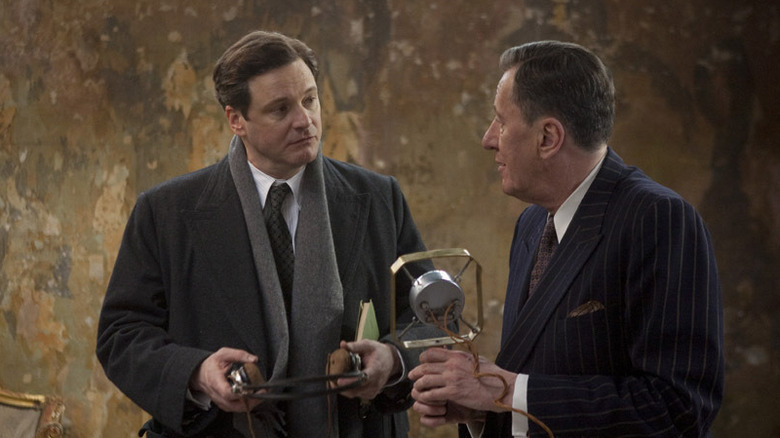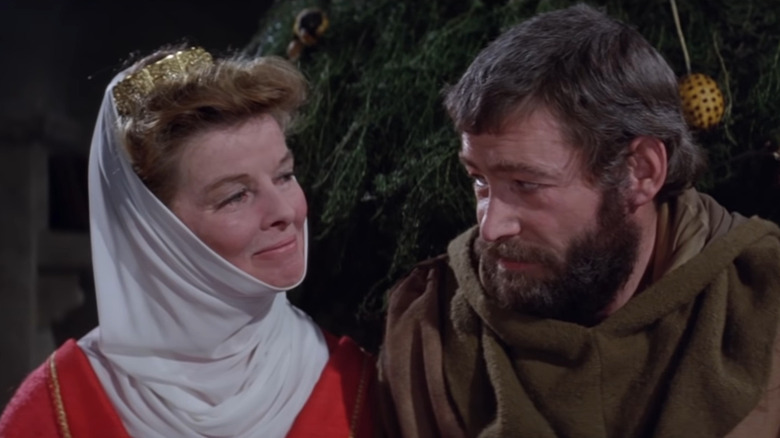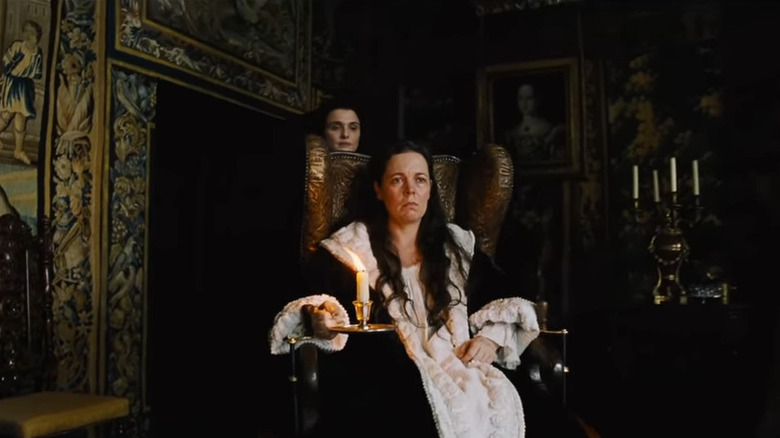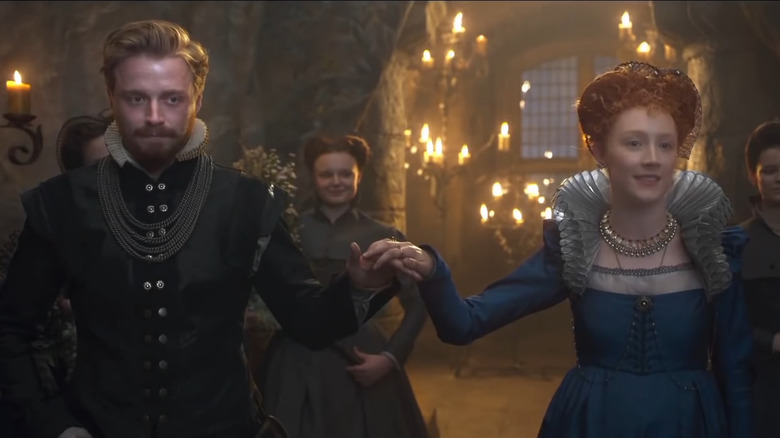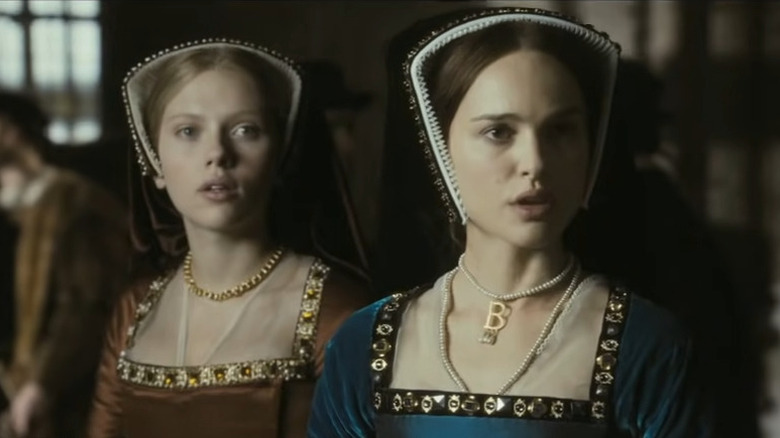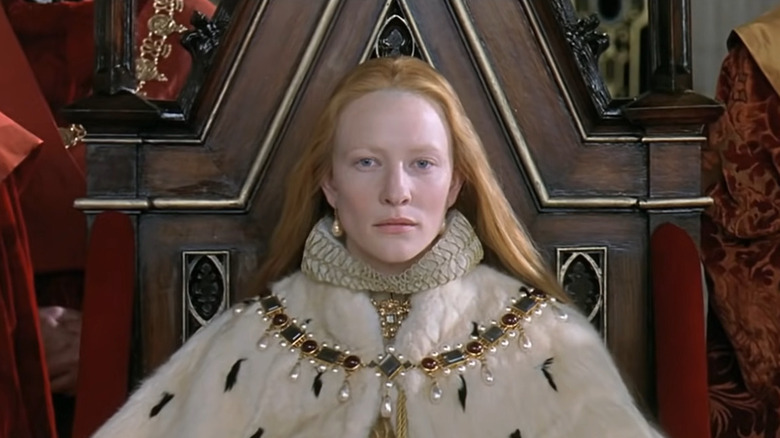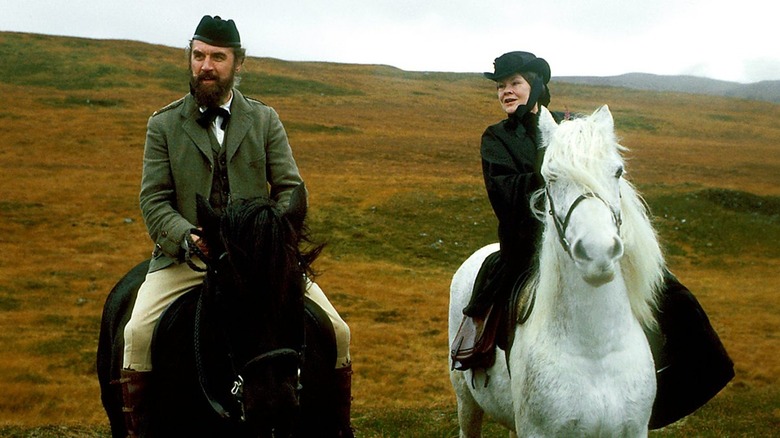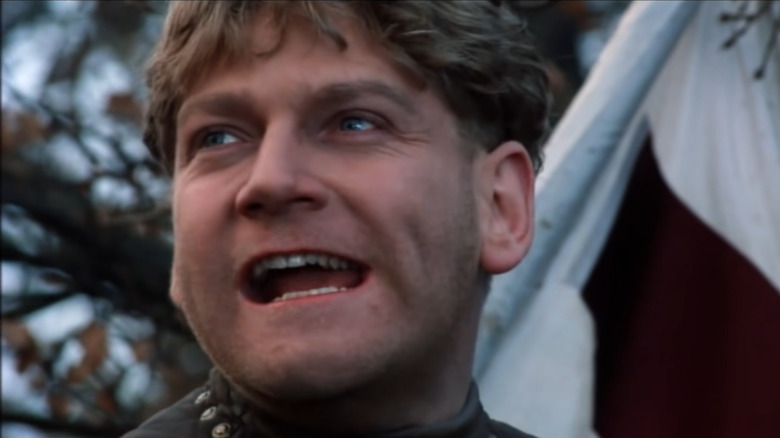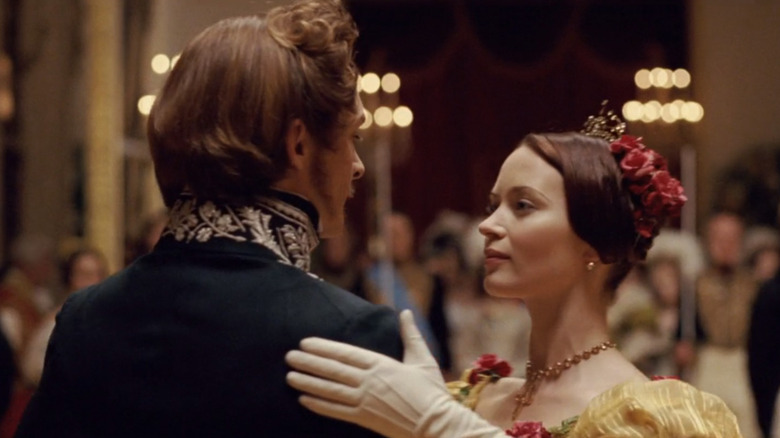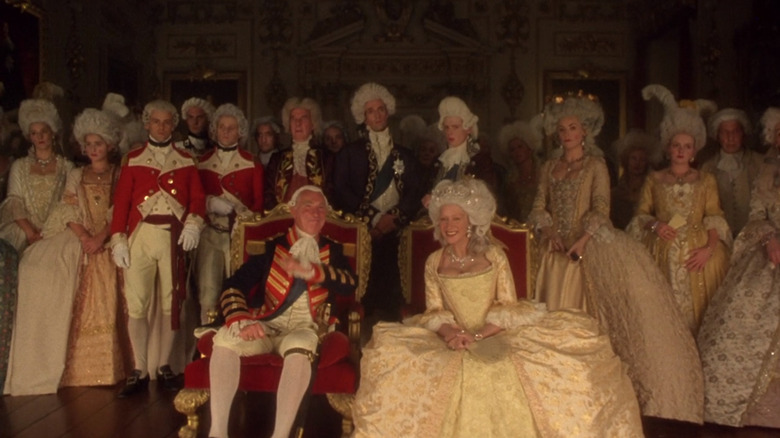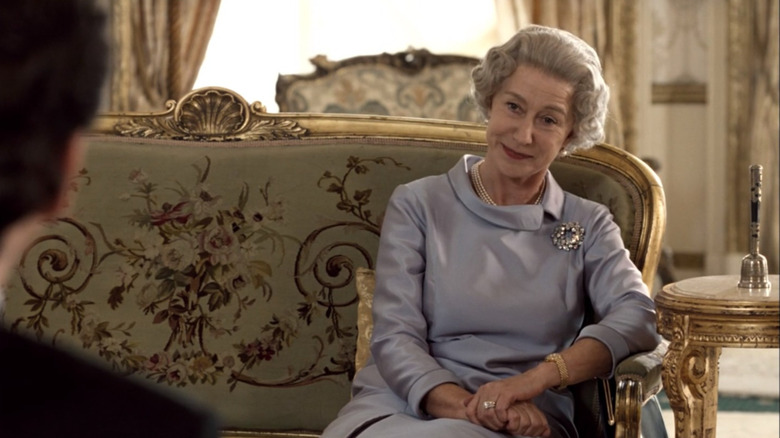The Best Movies About The Royal Family, Ranked By Historical Accuracy
Stories about the British royal family have been a fixture of public entertainment for as long as there's been a British royal family. From Chaucer to Shakespeare to modern-day scribes like Peter Morgan, writers just can't resist the subject. Nor can actors like Laurence Olivier, Anthony Hopkins, Helen Mirren, Cate Blanchett, Saoirse Ronan, and Timothée Chalamet, many of whom have received critical praise for their cinematic royal portraits. Even non-monarchists can see why. Though British period pieces have a reputation for being a little too stiff-upper-lip, the legendary lives of all those Henrys, Georges, and Elizabeths come preloaded with high stakes, palace intrigue, political scandal, and illicit affairs, not to mention lavish sets, costumes, hair, and makeup.
Still, though the royals have given us centuries' worth of drama, most historical fiction about them is just that ... a fantasy built around a scaffolding of the facts. Sometimes the changes made are easy to rationalize. Characters and events can be composited or condensed to save time, imagined scenarios can be plugged in where the historical record lapses. In other instances, such creative liberties are taken that the resulting film is no longer a reasonable representation of the truth. These are the best movies about the British royal family, ranked with quality and accuracy in mind.
15. W.E.
This 2011 film was written and directed by Madonna, and the negative critical and commercial response it garnered derailed her nascent behind-the-camera career. "W.E." tells two stories more than 60 years apart. In one, a New York wife is unhappy in her marriage and obsessed with Edward VIII's abdication of the throne for his divorced girlfriend, Wallis Simpson ... so obsessed, in fact, that she travels to a Sotheby's auction and spends thousands of dollars. The auction is the framing device for Madonna to tell the story that's of more interest to this list: That fraught relationship between the disgraced king and Wallis, and the effect it had on world affairs.
The story of Edward VIII (David, to his friends) and Wallis Simpson is undeniably fascinating. And "W.E." should be praised for exploring one crucial idea: that Wallis may have felt as trapped in her marriage, as many non-infamous women do. But it glosses over a much darker issue: David and Wallis personally visited Hitler and were sympathizers. In fact, the American FBI under President Roosevelt's command was keeping tabs on the Duke and Duchess of Windsor, as information suggested they might be involved in a German plot to reinstall David to the crown. "W.E." is troublingly unconcerned with David's problematic politics, at home and abroad. Madonna's film also makes sloppy mistakes such as referring to King George V as King George III (which is off by 116 years) and misrepresenting the Queen Mother's accent.
14. Spencer
In a title card, Pablo Larraín calls his 2021 film "Spencer" a "fable from a true tragedy." That's an artsy way of saying that isn't a biopic by any stretch of the imagination. Larraín isn't going for literal veracity; he's creating an atmosphere in which he believes the Princess of Wales was trapped every day of her blessed and cursed royal life.
"Spencer" — which stars Kristen Stewart in an Oscar-nominated title performance — takes place at Sandringham during the Christmas season, just before Charles and Diana officially separated. In stark contrast to stuffy period pieces with heavy, stilted dialogue, "Spencer" unfolds like mostly silent horror. The implication is that Diana's existence is intolerable, and every waking moment is a nightmare that plays tricks on her mind. The film takes kernels of truth and builds them into an abstract portrait of a princess. Larraín demonstrates this by forcing her to be weighed as part of a holiday tradition (which may well have happened), by having her swallow a pearl from her necklace as she's dining on pea soup, and by having her get salaciously close to her dresser (both of which surely did not).
While Diana did sometimes visit the kitchen, the supporting characters — in particular Sally Hawkins and Timothy Spall as Royal staff — aren't even composites of real people who encountered the princess. "Spencer" is an odd but thought-provoking film that divided viewers and left an impression more than it provided an account.
13. The King
"The King," starring Timothée Chalamet, is inspired by Shakespeare and real British history, but isn't a very faithful retelling. Henry — or Prince Hal — is more interested in girls and booze than succeeding his father to the crown. King Henry IV decides his younger son Thomas should rule, but Thomas dies in battle after a hot-headed Hal upstages him, then Henry IV dies of illness, so Hal becomes King anyway. He's ill-suited for the job. The French Dauphin insults him, and his own people think he's weak and gullible. But in the end, he is victorious in combat, politics, and love.
"The King" makes for a decent, gritty sword-slashing epic, but it totally mischaracterizes Hal's personality, and it butchers the chronology and circumstances of Henry V's actual reign. In real life, Hal never shied away from political or military leadership and was known to be vicious to those who opposed him. He didn't inherit the throne because of his brother's death; Thomas died eight years later in a different battle. King Henry V didn't attack France because of a slight by an arrogant Dauphin, nor did he ever meet the Dauphin on the battlefield. The real French prince was a hyper-religious and sickly man, and Henry's motivation was to rule more territory. There was an actual Battle of Agincourt (it marked one of the most important swings of power in the Hundred Years' War), but "The King" gets the terrain and positions (though not the tactics) wrong.
12. Elizabeth: The Golden Age
2007's "Elizabeth: The Golden Age" is the less critically acclaimed follow-up to "Elizabeth," released in 1998. Both star Cate Blanchett as the Virgin Queen. In the sequel, both Elizabeth and Protestant England face threats of invasion from Spain's King Philip (her ex-brother-in-law) and Catholic plots to replace her with her cousin Mary, Queen of Scots, or Philip's own daughter, Isabella. Meanwhile, she's become enamored with explorer Sir Walter Raleigh and assigns one of her ladies-in-waiting, Bess, to keep tabs on him, a plan that will backfire spectacularly. Bess becomes pregnant with Raleigh's child, for which she imprisons them in the Tower of London before releasing him to fight the Spanish Armada.
"Elizabeth: The Golden Age" is accurate in the broadest sense, but it fudges the details for the sake of drama. Elizabeth I would've been in her 50s rather than her 30s at the time. The English weren't at a disadvantage in the final battle: Their Navy outnumbered the Spanish Armada, and Sir Walter Raleigh's role in the fighting is exaggerated. So is his role in her life. Though she did enjoy his presence at Court, and she did jail Raleigh and Bess in the Tower (where their baby died of plague), their punishment was for marrying without her permission. The Babington plot also didn't play out as shown. The conspirators were found out through letters, so there was no shooting. But their deaths — including Mary's — were far more gruesome.
11. The King's Speech
"The King's Speech" is as feel-good a movie about the lead-up to World War II possibly could be, and — though this 2010 film won the Academy Award for best picture — that's something to hold against it. Colin Firth plays Bertie, the second son of King George V, who suffers from a stutter. When his father dies and his brother (the aforementioned David/Edward VIII from "W.E.") abdicates, Bertie realizes the crown will fall on his head. The soon-to-be George VI dreads the spotlight because of his stammer, so his wife encourages him to use the services of an Australian speech therapist, Lionel Logue. At first, Bertie dislikes the brash Logue and his strange methods, but as they begin to work, he overcomes his impediment and makes a lifelong friend.
In real life, Logue did help Bertie with his stutter and they indeed became friends. However, those elocution lessons began in 1926, and the issue was largely resolved by 1927. In the film, Bertie's therapy occurs between 1934 and 1939, to coincide with his coronation and the war. Britain's coddling of Hitler and the Nazis is regrettably under-explored in "The King's Speech," the result of which is that everyone's reputation is a bit cleaned up. Winston Churchill is presented as a supporter of Bertie, though in reality, he risked his reputation to support David. And the film waves away the fact that Neville Chamberlin (and King George VI by extension) appeased Germany while Hitler expanded his empire until Britain could stay impartial no longer.
10. The Lion in Winter
1968's "The Lion in Winter" is based on a play, mostly operating as a collection of conversations between palace walls. But don't let the lack of action fool you. Starring Peter O'Toole, Anthony Hopkins, and Katherine Hepburn in an Oscar-winning performance, this Medieval drama about a royally dysfunctional family is anything but tame.
It's 1183, and King Henry II has his powerful wife Eleanor under house arrest while he carries on with Alais, a young woman he has promised to one of his sons as part of a treaty with France. He frees Eleanor for Christmas so the couple can negotiate important political matters: who will rule, who will inherit Aquitaine, and who will wed Alais. Two of the sons in question are Richard and John (of "Robin Hood" fame); Henry wants John to succeed him, but Eleanor favors Richard. The holiday gathering is an opportunity for everybody to scheme, "Game of Thrones" style.
While there was no 1183 Christmas court at Chinon Castle, the historical context for "The Lion in Winter" is mostly factual. Eleanor separated from her first husband, the king of France, when she failed to produce heirs. Henry did keep her captive after she supported her sons and the French Prince Philip II in a revolt against him, and she did plot to ensure that Richard and then John would wear the crown. The King had many mistresses, and Alais may have been one, but his and Eleanor's marriage was about statecraft, not love. In the film, Richard and Philip have a romantic past. There is some evidence to support this, though scholars remain divided.
9. The Favourite
Greek filmmaker Yorgos Lanthimos might seem like a bizarre choice to direct a period piece about Britain's Queen Anne. But 2018's "The Favourite" turned out to be a critical darling, combining historical fiction and avant-garde dark comedy to stunning effect. Olivia Colman won an Oscar for her portrayal of an indulgent and indifferent Anne in her golden years, and though Lanthimos himself said in an interview with the Hollywood Reporter that, "some of the things in the film are accurate, and a lot aren't," you might be surprised how much in "The Favourite" is rooted in history.
In the film, Anne — whose health is failing — turns a blind eye to the ongoing war with France and instead fixes her attention on two women in her court: Sarah (Rachel Weisz) and Abigail (Emma Stone). Sarah is Anne's longtime lover, and she wields a considerable amount of political power through her relationship with the Queen. Abigail, Sarah's financially ruined but beautiful young cousin, is new to court. While Sarah is busy with the war, Abigail gets into the Queen's good graces, and a violent love triangle ensues.
"The Favourite" takes considerable liberties. But the film also gets more details right than most biopics. Anne did have 17 miscarriages and lost 5 children (as represented by pet rabbits in the movie), she suffered from gout (or possibly lupus), Sarah tried to blackmail her, and Abigail married Masham and become the keeper of the privy purse. Even the lesbianism can be traced to real rumors. Though Anne and Abigail were both pious, Sarah wrote naughty poetry about Anne meant to tarnish her reputation after their falling out.
8. Mary Queen of Scots
This 2018 costume drama tells the story of the relationship between Queen Elizabeth I and Mary, Queen of Scots from Mary's perspective. A teenage Mary (Saoirse Ronan) returns to Scotland from France where Catholics celebrate her arrival and Protestants worry about her claim to England's throne. Elizabeth, who comes down with smallpox around this time, decides to marry her off to an Englishman; she considers her own lover Robert Dudley before sending Henry Darnley. Their union is a disaster from the first night: Darnley's a power-hungry drunk who cheats with her secretary, Rizzio. Her Protestant half-brother Moray and other like-minded nobles mount a rebellion against her. Everybody tries to kill everyone else, but Mary succeeds in giving birth to a son, James, and names Elizabeth his godmother. Alas, it's all for naught. After a secret meeting with Elizabeth, Mary's correspondence in the Babington plot seals her fate and she loses her head.
The bones of "Mary Queen of Scots" are solid, though the timeline is condensed. The major players all actually existed, and the major events featured in the film did happen. The film nails the life-and-death tension between Catholics and Protestants at the time, it gets closer to the truth of the Babington Plot, and it even correctly includes Elizabeth's smallpox and Mary's red dress. But it adds two apocryphal scenes: Elizabeth and Mary never met face-to-face in real life, and it's unlikely that Darnley and Rizzio were lovers (though, by all accounts, Darnley still wasn't a great husband).
7. The Other Boleyn Girl
Anne Boleyn is notorious, even to those who don't know royal history, and 2008's "The Other Boleyn Girl" claims to be her true story. Based on Philippa Gregory's novel, the film version sums up an important period in British history, but it adds to Anne's unfair reputation with more melodrama than is necessary.
Anne and her sister Mary are invited to court after their father schemes to make Anne Henry's mistress, but Henry is initially taken with the already-wed Mary. After she gives birth to his illegitimate son, the family's status improves. When Mary interferes in Anne's own love life, Anne endeavors to get her revenge by cozying up to Henry with the promise of a proper heir. She manipulates Henry into divorcing Queen Catherine and breaking from the Catholic Church, but her marriage is a prison of her own making and ultimately her death sentence.
Many viewers will already know it's true that Henry left Catherine and England left the Catholic Church for Anne, but it's also true that Mary Boleyn slept with Henry and that Anne and George were accused of an inappropriate relationship. However, "The Other Boleyn Girl" often misrepresents its characters' motivations. Mary, who was actually the older sibling, cavorted with powerful men, including the King of France, while Anne was more modest. Historians strongly believe that Henry's incest claims were merely a fabricated pretense for his and Anne's annulment and her execution, which — in addition to his lust for Jane Seymour — may have been politically motivated.
6. Elizabeth
"Elizabeth" was embraced much more warmly by critics, audiences, and awards bodies than its successor "Elizabeth: The Golden Age," but it's only marginally better as the queen's biography. The film begins as an imprisoned Elizabeth's half-sister and rival, Queen Mary, succumbs to cancer. Elizabeth is freed and becomes queen herself. The England she will rule is in shambles and the hostility between Catholics and Protestants is still at a fever pitch. Her advisors implore her to marry, but she's unimpressed with her suitors (especially the cross-dressing Henry of France) and content in her affair with Lord Robert Dudley (that is, until she finds out he's married). She fends off snakes within her own administration, including her former lover, and eventually decides to rule as a woman, alone, according to her own instincts.
Let's start with what's true. Mary did imprison Elizabeth in the Tower of London, and Elizabeth did inherit a politically and religiously fractured kingdom. Though historians can't be sure, it's very likely she had some sort of love affair with Dudley. And of course, it's true that she was never married, though she didn't admit these intentions early on, so that she could dangle herself as a political prize for potential suitors and allies. "Elizabeth" is seen through too modern a lens, and it changes a few too many facts for the sake of higher stakes and a shortened timeline.
5. Mrs. Brown
The title cards at the end of "The Young Victoria" explain that Prince Albert died twenty years into his and Victoria's marriage, and the queen mourned for the rest of her life. That's true, but as the 1997 film "Mrs. Brown" shows, mourning didn't preclude her from living.
In the years following her husband's passing, Victoria is withdrawn and England is just beginning to entertain the possibility of republicanism. Those who support the Crown convince John Brown — the late Albert's loyal servant and a rough-hewn Scotsman — to come to court to cheer up the Queen and encourage her to return to public life. Victoria and John become close, then very close, and the very same monarchists who schemed to reintroduce Mr. Brown to their Royal Highness now resent his bad influence. John makes Victoria noticeably happy, and as rumors about their relationship begin to swirl, the damage to her popularity grows. The Prime Minister wants Brown to use that influence to convince Victoria to resume her duties before it's too late.
"Mrs. Brown" might be the only film on this list that downplays the real-life drama. The film keeps the nature of their friendship vague and chaste, but many historians believe (as did Victoria's own children) that John was, indeed, her lover. Their relationship was the subject of gossip and the British people largely didn't approve. The Monarchy did butt up against republicanism in the 1860s, but that had to do with an economic crisis as well as Victoria's lagging popularity.
4. Henry V
Shakespeare wrote 10 histories, and though all of them are heightened versions of the truth for the enjoyment of Elizabethan audiences, "Henry V" is one that hews closest to who the real man may have been. While Netflix's "The King" tries to cover more territory, Both Shakespeare's "Henry V" and Kenneth Branagh's 1989 film adaptation and directorial debut focus primarily on the King's military campaign against France leading up to the Battle of Agincourt, and are the better for it. Some story beats are repeated, such as the Dauphin's insulting gift and Henry's muted response. But Branagh's King Henry V (he was 29 at the time of filming; the same age as Henry would've been in 1415) is an appropriately strong, savvy, and mature leader.
Because it's such a faithful translation of the source material, it can't help itself from taking some of Shakespeare's poetic license. Falstaff — the Bard's recurring composite character — is here again, though in a diminished role. England's heroism in the Battle of Agincourt is perhaps overstated, but Branagh corrects the stage version's reliance on hand-to-hand combat in favor of what really won the day, bows and arrows. In lionizing Henry, it omits the fact that he ordered the slaughter of thousands of French prisoners. Shakespeare doesn't have this brutality play out on stage, but it at least mentions it in the dialogue. Just like the man himself, 1989's "Henry V" isn't perfect, but it gets points for being pretty true to both history and the play that inspired it.
3. The Young Victoria
There's much to recommend "The Young Victoria." It's short, exceedingly watchable, gorgeous to look at, and it features strong performances from Emily Blunt, Rupert Friend, and Paul Bettany. Plus, if you want to know what Queen Victoria's early reign was really like, this 2009 period drama written by Julian Fellowes of "Downton Abbey" fame is so accurate, it's almost nonfiction.
Teenage Victoria is heir to the British throne, and her uncle, King William IV, is near death. Victoria's mother and her comptroller John Conroy are oppressive guardians who keep her from Court in the hope that they'll rule as regents. When Victoria becomes Queen, she has to deal with people who want to take advantage of her, including Prime Minister Lord Melbourne, who wants power through her favor, and King Leopold of Belgium, who wants to fix her up with his nephew, Prince Albert.
"The Young Victoria" has an impressive attention to detail. The King did declare he'd live long enough to avoid a regency period while Victoria was under 18, since he distrusted Victoria's mother and Conroy. Her early rule was influenced by Melbourne and was marred by the Bedchamber Crisis – her popularity didn't increase until after her marriage to Albert, which was a real love match. Fellowes' script only exaggerates Victoria's relationship with Melbourne and the assassination attempt: Though Victoria survived several threats on her life throughout her time on the throne, Albert never actually took a bullet for his wife.
2. The Madness of King George
King George III is back in the spotlight these days thanks to "Hamilton," where he's a minor character, played for comic relief. But he had a whole movie to himself in 1994: "The Madness of King George," starring Nigel Hawthorne, Helen Mirren, and Rupert Everett. At the start, the King is a lively and sympathetic ruler with a doting wife, Queen Charlotte (of "Bridgerton" fame), and 15 children. The eldest of those children — George, Prince of Wales — has secretly married a Catholic woman without his father's permission. When King George begins to experience physical and then mental distress, the Prince begins to imagine himself acting as regent. Two politicians get stuck in the middle of the royal family's business. Prime Minister William Pitt needs King George to remain in power for his policies to prevail, while opposition leader and reformist Charles Fox can get his way if the Prince of Wales assumes control.
The film handles the subject of King George III's failing health with surprising sensitivity and accuracy, as it attempts to diagnose a man's illness and treatment from more than 200 years into the future. It also paints an honest picture of its supporting players' political machinations. The Prince of Wales did secretly wed Maria Fitzherbert, which (temporarily) disqualified him from succession, and he and Fox did bring about a Regency Bill which would've given him the right to rule, had the King not recovered (although he didn't race to Parliament to stop it, as he does in the climax of the film). It's even true that a woman tried to assassinate him with a dessert knife.
1. The Queen
The film that covers the current resident of Buckingham Palace is also the film that gets the highest marks for quality and accuracy, not just because of the facts it gets right but because of the momentous feeling it captures. 2006's "The Queen" was written by Peter Morgan (the man behind "The Other Boleyn Girl" and Netflix's "The Crown") and stars Helen Mirren (of "The Madness of King George") in the role that won her an Academy Award. This critically beloved film was nominated for six Oscars altogether, as well as five BAFTAs, including its win for best picture.
"The Queen" takes place in the aftermath of Princess Diana's death, as Elizabeth II struggles to meet the public's expectations of her mourning. Since Charles and Diana were divorced, Elizabeth thinks the funeral should be a private and not a state matter. Prime Minister Tony Blair and Prince Charles disagree and realize the continued existence of the monarchy itself rests on whether Elizabeth can rise to the occasion.
As intimate a portrait as "The Queen" is, it's quite a feat that so much of it rings true. As is explained in the book "The Firm: The Troubled Life of the House of Windsor," one of the only oversights is that Robin Janvrin was not quite Her Majesty's private secretary yet, though he was the one who delivered the news. Curiously, though the film doesn't cast her in the most flattering light, Queen Elizabeth II gave it her seal of approval.
